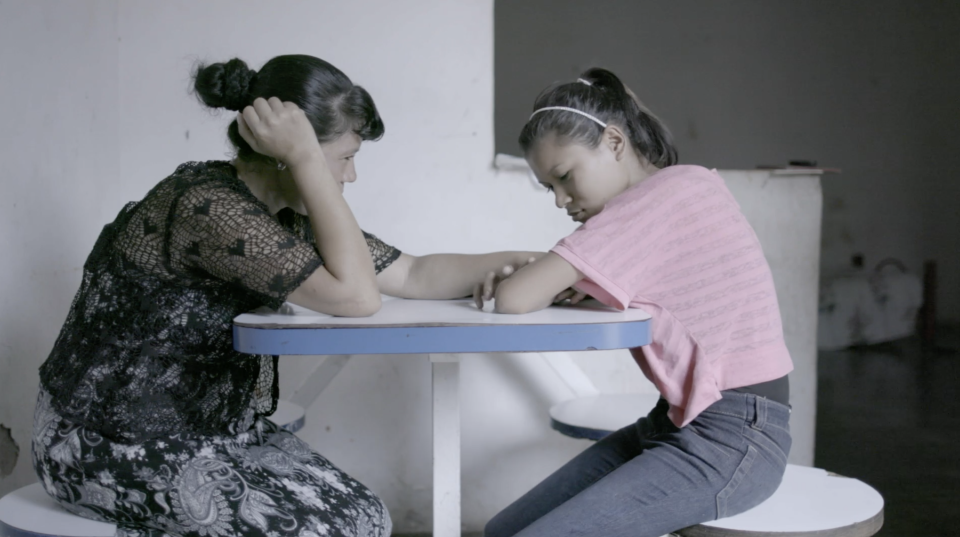Film documents Honduran family’s struggle to find asylum in U.S.
For Nelly, the protagonist of the documentary film “Towards the North,” the decision to leave her home in Honduras and seek political asylum in the United States was forced upon her.
“The leader of a gang needed my house. His men pointed a gun at me and said, ‘If you don’t leave, we will kill you, and your head will be hung on your front door,’” Nelly says in the film, which is part of the documentary initiative “Short Stories” from Yahoo News and RYOT Films.
Nelly’s story is horrific yet all too common among those fleeing Honduras, where recent violence has displaced more than 200,000 people and 65 percent of Hondurans live below the poverty line. Amid political unrest, an explosion of gang activity, and displacement caused by climate change, Central American migration to the U.S. has soared in recent years, yet the individual stories of those seeking asylum in the U.S. often go untold.
“Towards the North” showcases one family’s perspective on the other side of the border. Directed by Jessica Chermayeff and Joshua Bennett, the documentary follows Nelly, 37, and her daughter, Joseline, 17 — whose surnames are omitted to protect their privacy — over the course of four months in 2016 as they travel thousands of miles in an attempt to immigrate to the U.S. But after attempting to legally present themselves to immigration officials, the mother and daughter are turned away by agents who are overwhelmed by the number of immigrants at the border.
Chermayeff says it was “heartbreaking” see the two women stranded in limbo at the border.
“What actually happens to them is they’re neither accepted nor rejected,” Chermayeff told Yahoo News.

In 2016, the year Nelly and Joseline applied for asylum, U.S. Customs and Border Protection stopped more than 70,400 “family units,” defined as the number of individuals traveling in a family, from Honduras, El Salvador and Guatemala attempting to cross the border illegally. Promises of a border wall and anti-immigrant rhetoric were hallmarks of President Trump’s 2016 presidential campaign, so many migrants attempted the journey from Central America to the U.S.-Mexico border during the waning months of the Obama administration, Chermayeff said, because they feared harsher conditions under Trump.
“The sort of buzz on the ground was if you were thinking about trying to get in and apply for asylum, now was kind of it,” she said.
The Trump administration announced a deal in September with the Honduran government that gives U.S. immigration authorities the ability to send asylum seekers at the U.S.-Mexico border back to Honduras. As Nelly recounts in the film, that amounts to a death sentence.
“I knew two teenagers who grew up with my kids, and the U.S. denied their application,” Nelly says. “The day after they got back to Honduras, they were murdered.”
Despite the Trump administration’s crackdown on Central American migrants, there were 473,682 apprehensions of family units at the U.S.-Mexico border in 2019, and apprehensions of unaccompanied children reached 76,020, their highest level on record.
For Nelly and Joseline, the journey north landed them in a detention facility in July 2017 in Tijuana, Mexico, where they were housed for several months as they waited for their cases to be reviewed by U.S. officials.
Nelly and Joseline have since been released from detention and are now living in the United States. Nelly was released in the spring of 2018, and Joseline, who was eight months pregnant at the time, was released in the fall of 2017.

“I don’t feel that the film can or should argue about our policy,” Chermayeff said. “But I do think that films, as opposed to many other mediums, have the potential to let you spend time with people enough to recognize yourself in them. And it is truly a random set of circumstances that makes their reality different from anyone else’s. So I hope that people can see themselves in their shoes.”
You can learn more about Jessica Chermayeff and Joshua Bennett’s projects at humanityonthemove.org.


